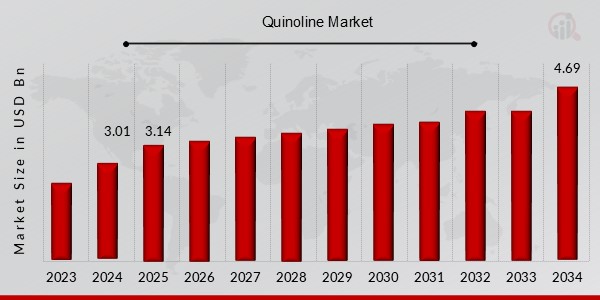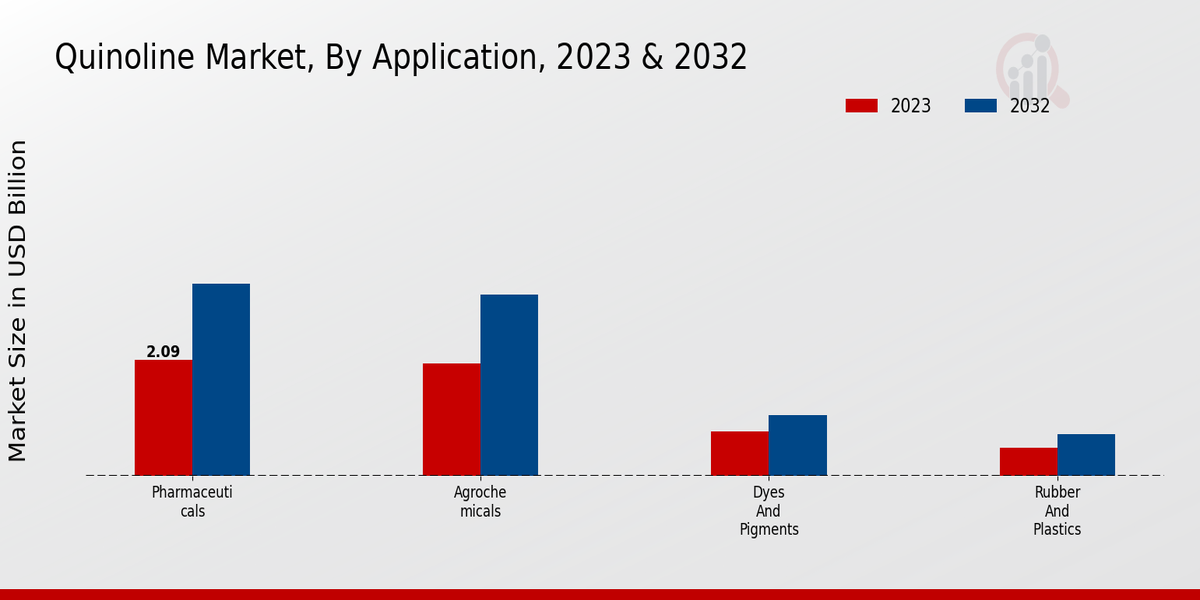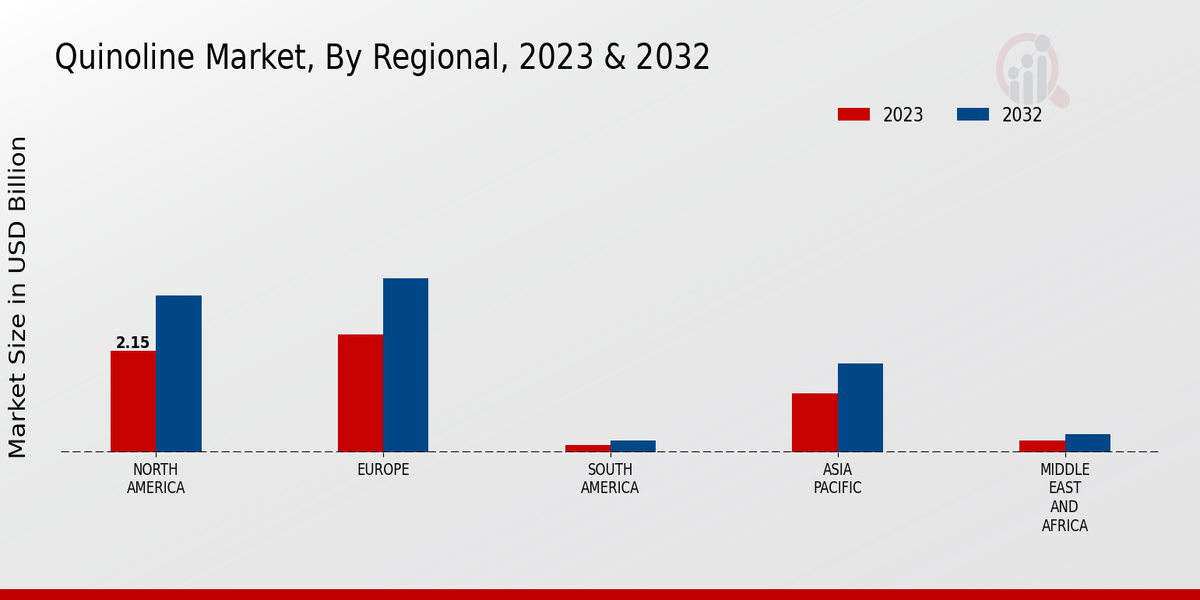Global Quinoline Market Overview
The Quinoline Market Size was estimated at 3.01 (USD Billion) in 2024. The Quinoline Industry is expected to grow from 3.14 (USD Billion) in 2025 to 4.69 (USD Billion) by 2034, with a CAGR (Growth Rate) of approximately 4.6% during the forecast period (2025–2034).
Key Quinoline Market Trends Highlighted
Quinoline Market and its Forecast by Market Size, Market Growth, and Trends is highly promising to grow even further owing to both internal and external factors. The quinoline market is targeted by the pharmaceutical industry, which zones in on the manufacturing of anti-malarial drugs and other healthcare products, enhancing the growth of the industry. Furthermore, quinoline is used in the form of pesticides and herbicides, which is also responsible for the growth of this market.
One such thing that is seen in the quinoline market is the increase in the demand for bio-based quinoline. People want more eco-friendly products and bio-based quinoline meets that requirement. On top of that, there is an increase in the presence of advanced technologies in the market, which has led to the improvement of the efficiency of quinoline manufacturing and the reduction of its hazardous effects on the environment.
The market is also driven by market participants forming strategies and creating strategies so as to remain competitive and take advantage of new market openings. Such collaborations are often seen to include joint research and developments, joint ventures, acquisitions and mergers. So, as the market is emerging, it is important for investors to be wise about these developments and adjust their plans in order to pursue and potentially benefit from the growth opportunities that will be available.

Source: Primary Research, Secondary Research, Market Research Future Database and Analyst Review
Quinoline Market Drivers
Rising Demand for Quinoline in the Pharmaceutical Industry
Quinoline is a very handy heterocyclic compound that is widely used in the pharmaceutical industry. It acts as a vital precursor for the preparation of a significant factor of drugs, such as anti-malarials, antibiotics, as well as anti-inflammatory agents.
The growth in the incidence of infectious and chronic diseases all over the globe has stimulated the demand for specific pharmaceutical products, hence contributing to the growth of the quinoline market.The sustained and relentless efforts on the part of the pharmaceutical industry in its bid to discover novel and more powerful drugs will further stimulate the demand for quinoline in the future.
Expanding Applications in Agrochemicals and Dyes
Quinoline is an important chemical building block that is applicable to the production of various chemicals, such as pharmaceuticals, agrochemicals, and dyes. It is widely used in the pharmaceutical industry for the production of different drugs. However, with respect to agrochemicals, quinoline serves as an important intermediate for the production of herbicides, pesticides, and fungicides. Agrochemicals are used to protect crops from pests and diseases.The growth in the global population and, therefore, the rise in food requirements have led to an increase in the use of agrochemicals.
At the same time, quinoline can be used in the dyes industry for the production of dyes and pigments. The expansion of the textile and automotive industries has facilitated the growth of the market in this regard.
Advancements in Chemical Synthesis and Manufacturing Technologies
There has been considerable progress in the Quinoline Market Industry due to the advances in chemical synthesis and manufacturing technologies. More efficient and cost-effective methods have been developed for the production of quinoline, which covers the creation of novel catalytic systems and the attainment of optimal reaction conditions.
These changes have been beneficial for the manufacturers as they have contributed to the higher yield and purity of the final product, making it more affordable and accessible for different purposes.In addition to this, improvements in extraction and purification techniques have made quinoline of better quality and, consequently, more desirable for use in various industries.
Quinoline Market Segment Insights
Quinoline Market Application Insights
Quinoline Market is divided based on application into Pharmaceuticals, Agrochemicals, Dyes and Pigments, Rubber and Plastics, and Other Applications. In 2023, the Pharmaceuticals segment dominated the Quinoline Market, giving over 35% of the revenue share. Moreover, the Agrochemicals segment is expected to witness the fastest growth, showing a CAGR of 6.6% in the estimation period. The reasons for their dominance and growth will be explained in the following sections. Pharmaceuticals: Quinoline has numerous uses in the pharmaceutical industry.It serves as an intermediate for the production of several classes of pharmaceuticals, such as anti-malarial, antibacterial, and anticancer.
With the increasing occurrence of malaria and other infectious diseases, the demand for quinoline and its derivatives as anti-malarial drugs is expected to increase. Indeed, hydroxylated quinolines are already on the World Health Organization list of essential medicines. Moreover, the market is expected to grow in the upcoming years, which positively affects the demand for quinoline as a pharmaceutical intermediate. Agrochemicals: Quinoline derivatives are used by agriculture as pesticides and fungicides. The global pesticide chemicals market was valued at 47 billion USD in 2020 and is expected to grow by 1 billion USD per year over the next several years.
The increasing demand for greener methods of agriculture and the demand for protecting the crops from pests and diseases are both expected to increase the demand for quinoline material and its derivatives.Dyes and Pigments: Quinoline is used as an intermediate for the production of pigments and dyes. Such dyes are used in the textile, automotive, and printing industries, as they are known for their vibrant tones and good lightfastness properties. Rubber and Plastics: Quinoline is used as a modifier in the manufacturing of rubber and plastic materials. Such quinoline-augmented materials are known for their durability and strength.
Other Applications: Quinoline also has uses in the cosmetics and electronics industries. For example, it can be employed as an antioxidant and antimicrobial agent in the production of consumer goods.

Source: Primary Research, Secondary Research, Market Research Future Database and Analyst Review
Quinoline Market Product Type Insights
Product Type segment of the Quinoline Market is classified into 2-Methylquinoline, Quinaldine, Quinoline-8-Carboxylic Acid, 2-Phenylquinoline, and Other Product Types. Among these, the 2-Methylquinoline segment held the largest market share in 2023, accounting for around 35% of the Quinoline Market revenue. The growth of this segment is attributed to the increasing demand for 2-Methylquinoline in the production of pharmaceuticals and agrochemicals. Quinaldine is another major product type segment, which is expected to witness significant growth during the forecast period.The growing demand for Quinaldine in the production of dyes and pigments is driving the growth of this segment.
Quinoline-8-Carboxylic Acid is another important product type segment, which is expected to exhibit steady growth during the forecast period. This segment is driven by the increasing demand for Quinoline-8-Carboxylic Acid in the production of pharmaceuticals and fine chemicals. 2-Phenylquinoline is another product type segment, which is expected to witness moderate growth during the forecast period. This segment is driven by the growing demand for 2-Phenylquinoline in the production of dyes and pigments.Other Product Types segment includes various other types of quinolines, which are used in a variety of applications such as pharmaceuticals, agrochemicals, and dyes.
This segment is expected to exhibit steady growth during the forecast period.
Quinoline Market Synthesis Route Insights
The Quinoline Market revenue is segmented by Synthesis Route into Skraup Synthesis, Combs Quinoline Synthesis, Conrad-Limpach Synthesis, Friedlander Synthesis, and Other Synthesis Routes. Among these, Skraup Synthesis held the largest market share in 2023 and is expected to continue its dominance over the forecast period. Skraup Synthesis is a versatile method for synthesizing quinoline derivatives, offering high yields and a wide substrate scope.
The Quinoline Market data shows that the demand for quinoline derivatives synthesized via Skraup Synthesis is primarily driven by the pharmaceutical industry.Combs Quinoline Synthesis and Conrad-Limpach Synthesis are other commonly used methods for quinoline synthesis, accounting for a significant market share. These methods offer advantages such as mild reaction conditions, high regioselectivity, and compatibility with various functional groups. The Friedlander Synthesis, known for its simplicity and efficiency, is also widely employed in the industry.
Other Synthesis Routes, including the Gould-Jacobs Reaction and the Knorr Synthesis, contribute to the market's growth, catering to specific synthesis requirements.The Quinoline Market segmentation provides valuable insights into the market dynamics and growth potential of each Synthesis Route. Understanding these segments enables stakeholders to make informed decisions regarding product development, market penetration, and competitive strategies.
Quinoline Market Purity Grade Insights
The purity grade segment plays a crucial role in determining the Quinoline Market revenue. '99.5%' purity grade holds the dominant position in the market, capturing a significant share due to its widespread usage in pharmaceutical and fine chemical applications. '99.9%' purity grade also commands a notable market presence, driven by its demand in specialized applications such as electronics and optics. '98%' and '99%' purity grades cater to cost-sensitive applications, while 'Other Purity Grades' address niche market requirements.
The market growth for higher purity grades, such as '99.9%' and above, is expected to outpace lower purity grades as industries prioritize quality and performance.
Quinoline Market Usage Form Insights
The Usage Form segment of the Quinoline Market is categorized into Liquid, Powder, Crystalline, and Other Usage Forms. Among these, the Liquid form holds the largest market share, accounting for around 55% of the Quinoline Market revenue in 2023. This dominance is attributed to the ease of handling, storage, and transportation of liquid Quinoline, making it a preferred choice for various applications. The Powder form is another significant segment, capturing approximately 30% of the market.
Powdered Quinoline is commonly used in the production of pharmaceuticals and agrochemicals, owing to its high purity and stability.Crystalline Quinoline, with a market share of about 10%, is primarily employed in the electronics industry, particularly in the manufacturing of organic light-emitting diodes (OLEDs). Other Usage Forms, which include Quinoline derivatives and specialty formulations, account for the remaining 5% of the market. The market growth for all Usage Forms is expected to be steady in the coming years, driven by increasing demand from end-use industries such as pharmaceuticals, agrochemicals, and electronics.
Quinoline Market Regional Insights
The Quinoline Market is segmented into North America, Europe, APAC, South America, and MEA. The North American region is expected to hold the largest market share in 2024, owing to the presence of a number of key players in the region. The European region is also expected to have a significant market share, due to the increasing demand for quinoline in the pharmaceutical and chemical industries.
The APAC region is expected to be the fastest-growing market, owing to the increasing demand for quinoline from emerging countries such as China and India.The South American and MEA regions are also expected to experience growth in the market, due to the increasing demand for quinoline from the pharmaceutical and chemical industries.

Source: Primary Research, Secondary Research, Market Research Future Database and Analyst Review
Quinoline Market Key Players And Competitive Insights
Major players in the Quinoline Market industry are constantly striving to gain a competitive edge by investing in research and development, expanding their product portfolios, and adopting innovative technologies. Leading Quinoline Market players are focusing on developing novel applications and formulations of quinoline to cater to the growing demand from various end-use industries. Partnerships, collaborations, and strategic acquisitions are common strategies employed by Quinoline Market development players to strengthen their market position and access new markets.
The Quinoline Market Competitive Landscape is characterized by intense competition, with established players and emerging entrants vying for market share.A leading company in the Quinoline Market is Merck KGaA, a German multinational science and technology company. Merck KGaA has a strong presence in the quinoline market, offering a comprehensive range of high-quality quinoline products. The company's commitment to innovation has resulted in the development of numerous novel quinoline derivatives with unique properties and applications. Merck KGaA has a global distribution network, enabling it to cater to the needs of customers worldwide.
The company's strong financial performance and extensive R&D capabilities position it as a formidable player in the Quinoline Market industry.Another prominent player in the Quinoline Market is HC Stark, a leading manufacturer and supplier of specialty chemicals. HC Stark offers a wide range of quinoline products, including quinoline, 2-methylquinoline, and 4-methylquinoline. The company's products are used in various applications, including pharmaceuticals, dyes, and agrochemicals. HC Stark has a global presence, with manufacturing facilities in Europe, Asia, and the Americas. The company's commitment to quality and customer satisfaction has earned it a strong reputation in the Quinoline Market industry.
Key Companies in the Quinoline Market Include
- Acros Organics
- Strem Chemicals
- Iris Biotech GmbH
- Tokyo Chemical Industry Co., Ltd.
- Alfa Aesar
- ABCR GmbH
- Enamine LLC
- Merck KGaA
- CombiBlocks
- AChemBlock
- J Scientific Ltd
- Fluorochem
- TCI Chemicals
- SigmaAldrich
- BOC Sciences
Quinoline Market Industry Developments
Rising demand for quinoline derivatives in the pharmaceuticals and agrochemicals industries is a key driver of market growth. Quinoline is used as an intermediate in the synthesis of various drugs, including anti-malarials, antibacterial agents, and anti-inflammatory medications. In the agrochemicals sector, quinoline derivatives are employed as pesticides and herbicides.Recent news developments include the launch of new quinoline-based products by major market players. For instance, in 2023, BASF introduced a new quinoline-based herbicide for use in soybean and corn crops.
Additionally, research and development efforts are focused on exploring the potential of quinoline derivatives in novel applications, such as in the development of electronic materials and organic light-emitting diodes (OLEDs).
Quinoline Market Segmentation Insights
Quinoline Market Application Outlook
-
Agrochemicals
-
Dyes and Pigments
Quinoline Market Product Type Outlook
Quinoline Market Synthesis Route Outlook
Quinoline Market Purity Grade Outlook
-
99.9%
-
Other Purity Grades
Quinoline Market Usage Form Outlook
Quinoline Market Regional Outlook
- North America
- Europe
- South America
- Asia Pacific
- Middle East and Africa
| Report Attribute/Metric |
Details |
| Market Size 2024 |
3.01(USD Billion) |
| Market Size 2025 |
3.14(USD Billion) |
| Market Size 2034 |
4.69(USD Billion) |
| Compound Annual Growth Rate (CAGR) |
4.66% (2025 - 2034) |
| Report Coverage |
Revenue Forecast, Competitive Landscape, Growth Factors, and Trends |
| Base Year |
2024 |
| Market Forecast Period |
2025 - 2034 |
| Historical Data |
2020 - 2024 |
| Market Forecast Units |
USD Billion |
| Key Companies Profiled |
Acros Organics, Strem Chemicals, Iris Biotech GmbH, Tokyo Chemical Industry Co., Ltd., Alfa Aesar, ABCR GmbH, Enamine LLC, Merck KGaA, CombiBlocks, AChemBlock, J Scientific Ltd, Fluorochem, TCI Chemicals, SigmaAldrich, BOC Sciences |
| Segments Covered |
Application, Product Type, Synthesis Route, Purity Grade, Usage Form, Regional |
| Key Market Opportunities |
Rising demand for quinoline derivatives Growing pharmaceutical industry Increasing use in agrochemicals Expanding electronics market Potential for novel applications |
| Key Market Dynamics |
Growing pharmaceutical industry, increasing demand for agrochemicals, rising consumption in personal care products, expanding automotive sector and government regulations |
| Countries Covered |
North America, Europe, APAC, South America, MEA |
Frequently Asked Questions (FAQ):
The Quinoline Market is anticipated to be valued at approximately USD 3.01 Billion in 2024.
The Quinoline Market is estimated to expand at a CAGR of around 4.6% from 2025 to 2034.
The North American region is projected to lead the Quinoline Market by 2034, accounting for a substantial market share.
The increasing demand for quinoline in the pharmaceutical and chemical industries, along with its applications in dyes and agrochemicals, is propelling the market growth.
Some prominent players in the Quinoline Market include LANXESS, BASF, Solvay, Merck KGaA, and Haihang Industry.
Quinoline finds applications in the production of pharmaceuticals, dyes, agrochemicals, and as a solvent in various industries.
The pharmaceuticals segment is projected to account for the largest share of the Quinoline Market by 2032 due to its extensive use in the production of anti-malarial drugs and other therapeutic applications.
The Quinoline Market is anticipated to reach a market valuation of approximately USD 4.1 Billion by 2032.
The Asia Pacific region is projected to exhibit the highest growth rate in the Quinoline Market from 2024 to 2032 due to the rising demand from emerging economies like China and India.
Stringent environmental regulations and the volatility in raw material prices pose challenges to the growth of the Quinoline Market.
















